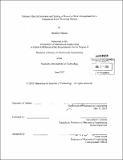Polymer material selection and testing of resistive wire arrangement for a transparent infant warming blanket
Author(s)
Salazar, Madeline
DownloadFull printable version (3.842Mb)
Other Contributors
Massachusetts Institute of Technology. Department of Mechanical Engineering.
Advisor
Alexander H. Slocum.
Terms of use
Metadata
Show full item recordAbstract
The ThermoCloud was designed as a portable, scalable, transparent electrical blanket to warm and insulate infants, while permitting hassle-free medical transportation and maximum visualization of a patient's thorax and extremities, without removing the blanket. The blanket consists of a resistive network of wires, located between two sheets of a clear polymer and is designed to reach 37°C and provide 50W heat generation with a 12V power supply and a 3[omega] effective resistance of the wire network. The alpha prototype of ThermoCloud is composed of thin nichrome wires arranged in parallel and sandwiched between two 0.76 mm thick sheets of PVC. The revised prototype developed in this thesis improves the performance by using a 0.10 mm thin sheet of polyethylene, which is softer, drapes and has better thermal conductivity, which will allow for an even distribution of heat. In addition, a new wire and network arrangement is explored that uses five parallel pairs of flat copper wires in series achieves the same resistance. Scale prototypes were fabricated and bench tested. While a temperature of 34°C was achieved and evenly distributed, hot spots formed at the copper bus bars and some likely failure modes were identified that should be addressed in future work.
Description
Thesis (S.B.)--Massachusetts Institute of Technology, Department of Mechanical Engineering, 2013. Cataloged from PDF version of thesis. Includes bibliographical references (pages 21-22).
Date issued
2013Department
Massachusetts Institute of Technology. Department of Mechanical EngineeringPublisher
Massachusetts Institute of Technology
Keywords
Mechanical Engineering.